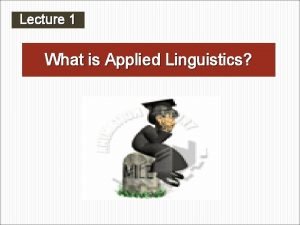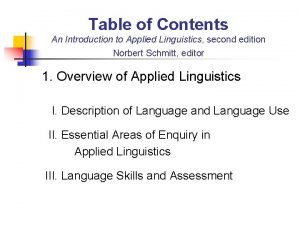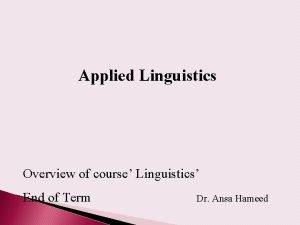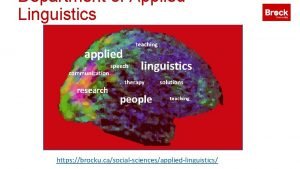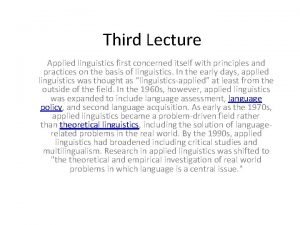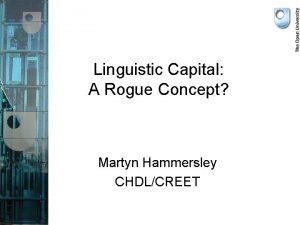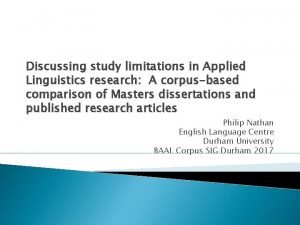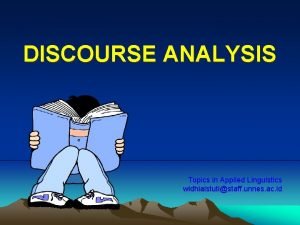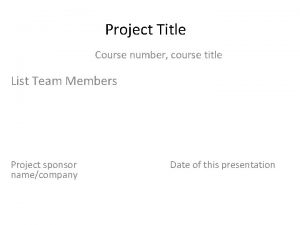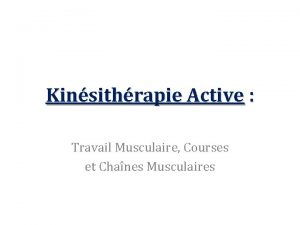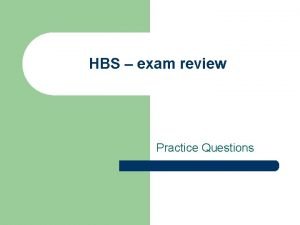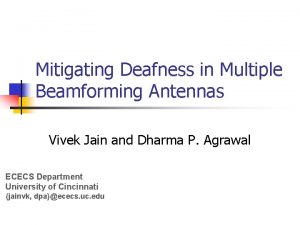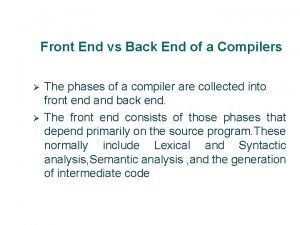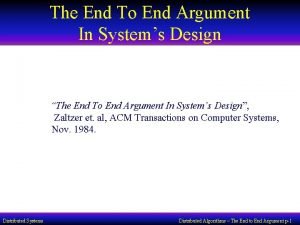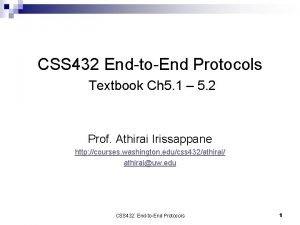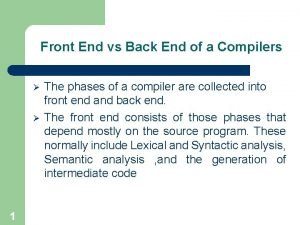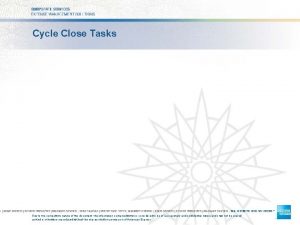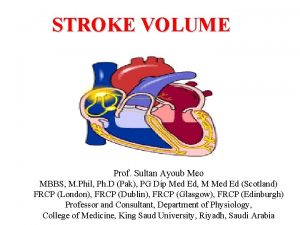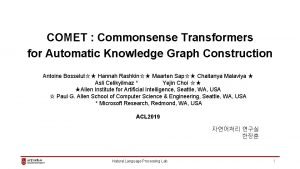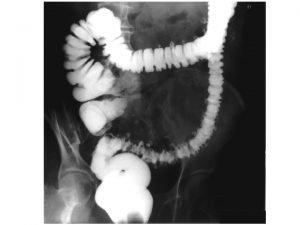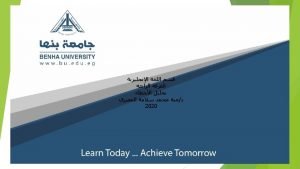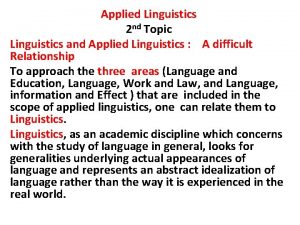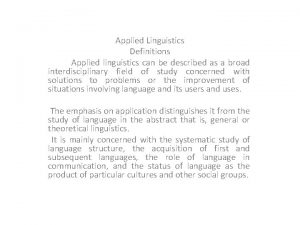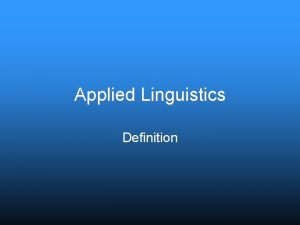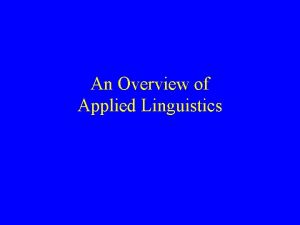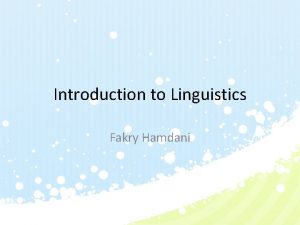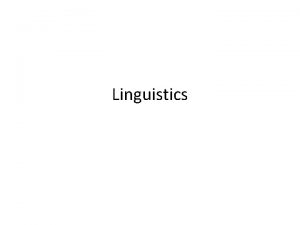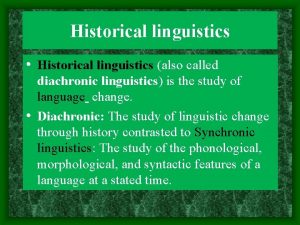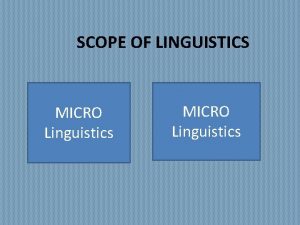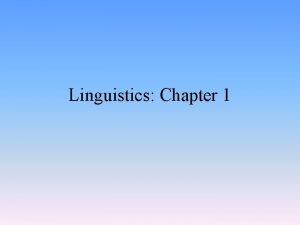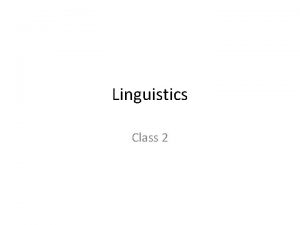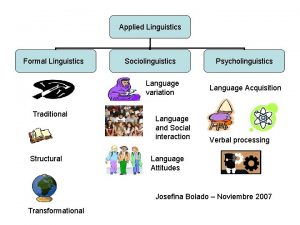Applied Linguistics Overview of course Linguistics End of























- Slides: 23

Applied Linguistics Overview of course’ Linguistics’ End of Term Dr. Ansa Hameed

Today’s Lecture • The definition of applied linguistics • The major fields of applied linguistics • Overview of course ‘Linguistics’

What is ‘applied linguistics’? Applied linguistics is a branch of linguistics where the primary concern is the application of the linguistic theories, methods and findings to the explanation of language problems which have arisen in other areas of experience.

History of Term: Applied Linguistics � The term Applied Linguistics (AL) is an Anglo-American coinage. � It was founded first at the University of Edinburgh School of Applied Linguistics in 1956. � Then at the Center of Applied Linguistics in Washington D. C. in 1957. � AL use was theoretical linguisticspropagated by those who clearly wanted to be known as scientists and not as humanists. � AL in the past based itself on the findings of

By the time AL has broadened itself as to make use of many sciences in language teaching, like: Sociology Psychology Logic Literature Mathematics Anthropology Computing Translation Statistics Philosophy Mrs. Hind Albeladi - March 2010

AL covers two main points: • The study of second and foreign language learning and teaching. • The study of language and linguistics in relation to practical problems. t e s d r a h c i R 5 8 9 1 al.

DEFINITIONS

AL is the utilization of the knowledge about the nature of language achieved by linguistic research for the improvement of the efficiency of some practical task in which language is a central component. r e d r o C 1974

l a t s y Cr 1985 A branch of linguistics where the primary concern is the application of linguistic theories, methods and findings to the elucidation of language problems which have arisen in other areas of experience.

“a multidisciplinary approach to the solution of language-related problems. ” s n e v Stre ) 2 9 9 (1

Aim of Applied Linguistic Studies: ü ü The study of second language and foreign language learning and teaching. ü Investigate problems related to language learning and teaching. ü To find some practical steps to solve those problems.

The need for A L The importance of AL lies in the significant role it has in solving language-related problems. � Language is crucial to human lives. Without language, most important activities will be inconceivable. � Throughout the history and across the world, people have been using language to communicate. � In our world there are many rapid changes. These changes affect how people use language. � Hence, people need to investigate and understand the facts of language use, to organize and formalize what they know and to subject their knowledge to rational consideration and critical analysis. � Only by doing so, people will be able to set out the options for action and the reasoning behind them. � Mrs. Hind Albeladi - March 2010

Some of the questions that applied linguists ask include: - How can languages best be learnt and taught? - What social factors affect language learning? - How can technology be used to contribute to the effectiveness of language teaching/learning? - What are the related problems associated with language disorders? - How can these be prevented? Mrs. Hind Albeladi - March 2010

Major Branches of AL: bilingualism and multilingualism second language acquisition contrastive linguistics literacies lexicography language assessment discourse analysis conversation analysis translation language pedagogy pragmatics language planning and policies computer-mediated communication (CMC) Mrs. Hind Albeladi - March 2010

Some of the Areas related to A L Speech therapy CALL Language Teaching Lexicography & Dictionary Making AL Language Policy & Planning Mrs. Hind Albeladi - March 2010 Translation

Conclusion AL has become an independent and mature discipline since the middle sixties of the last century. As an applied science that has a definite goal to reach, it is interdisciplinary in nature: it seeks to apply all the related fields to foreign language education. It is process-oriented in the sense that it is interested not only in the product, but also in the process of teaching. Mrs. Hind Albeladi - March 2010

Conclusion This implies the investigation of the internal structure or the cognitive aspects of the learner. It is very important for language teachers to have an understanding of the different aspects of language and draw out useful implications and applications foreign language learning and teaching. Mrs. Hind Albeladi - March 2010

References Cook, G. (2003). Applied linguistics. Oxford: Oxford University Press. R. B. Kaplan (Ed. ) (2002), The oxford handbook of applied linguistics New York: Oxford University Press.

End of Term

Course Outline: Linguistics (ENG 455) � Topics Covered: � Introduction to Linguistics � Modern Linguistics vs. Traditional Grammar � Language: Definitions, Form and Function � Human communication vs. Animal Communication � Levels of Language � Phonetics � Phonology

� Morphology � Syntax � Syntactic Analysis � Semantics � Pragmatics � Language Origin � Language Development � First Language Acquisition � Second Language Learning

� Historical Linguistics � Structuralism: Saussure � Generativism: Chomsky � Functionalism: Halliday � The Prague School � The London School � Relational Grammar � Tagmemics (In syntax lectures) � Case Grammar (In syntax lectures) � Startificational Grammar (In syntax lectures)

� Applied Linguistics � Sociolinguistics � Sign Language � Discourse Analysis � Thank You
 Linguistics vs applied linguistics
Linguistics vs applied linguistics Applied linguistics
Applied linguistics Linguistic branch
Linguistic branch Branches of linguistics
Branches of linguistics Brock university applied linguistics
Brock university applied linguistics Scope of applied linguistics
Scope of applied linguistics Applied linguistics
Applied linguistics Scope of the study
Scope of the study Discourse analysis topics
Discourse analysis topics Branches of linguistics
Branches of linguistics Traditional linguistics and modern linguistics
Traditional linguistics and modern linguistics Course title and course number
Course title and course number Course interne moyenne externe
Course interne moyenne externe English bond t junction
English bond t junction Hbs eca study guide
Hbs eca study guide End to end delay
End to end delay Front end of compiler
Front end of compiler End to end argument
End to end argument End to end
End to end Frontend and backend of compiler
Frontend and backend of compiler End to end accounting life cycle tasks
End to end accounting life cycle tasks Heart stroke volume
Heart stroke volume Comet transformer
Comet transformer Descendorektostomie definition
Descendorektostomie definition
